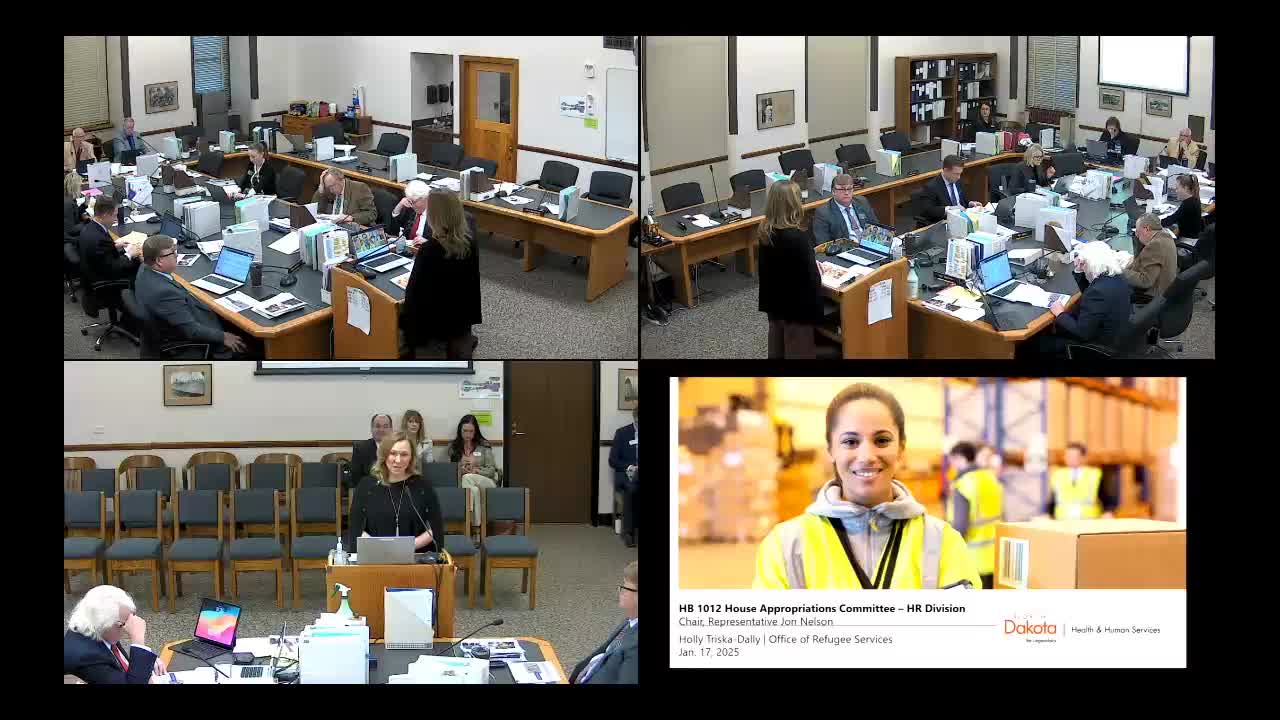State refugee coordinator outlines surge in arrivals, requests federal-authority-based grants to scale services
Get AI-powered insights, summaries, and transcripts
Subscribe
Summary
Holly Triska Dolly, state refugee coordinator, told the Human Resources Division that refugee arrivals in North Dakota have increased sharply and that the Office of Refugee Services seeks increased federal grant authority and investments in employment, English-language learning, transportation and data systems.
State refugee coordinator Holly Triska Dolly told the House Appropriations Committee’s Human Resources Division that refugee arrivals in North Dakota have increased sharply and that state-administered federal grants must scale to meet workforce and community-integration needs.
Dolly said the office’s mission "is to create community collaborations that strengthen and guide newcomers as they become welcomed neighbors and valued contributors to the economy." She explained the federal-state structure: the U.S. Office of Refugee Resettlement (ORR) funds initial resettlement and a separate federal allotment supports the state Office of Refugee Services, which emphasizes long-term employment, English-language learning and community integration.
Arrivals and funding: Dolly provided arrival counts the office is using for budgeting: 219 refugee-eligible arrivals in federal fiscal year 2022, 421 in 2023 and 804 in 2024. She said the office is projecting roughly 1,100 arrivals in the coming year and that federal funding for community grants is formula-driven with a two-year lookback on arrivals; the office therefore expects grant authority to increase in line with arrivals. The office told the committee it is seeking authority that would increase grants for community partners and expand program operations; Dolly said the biennial request anticipates roughly a $10 million increase over the biennium, chiefly to fund grants and services tied to the increase in arrivals.
Program design and partners: Dolly explained the federal refugee resettlement sequence: resettlement agencies (she named Global Refuge in Fargo and Church World Service affiliates in Bismarck and Grand Forks) provide the first 90 days of intensive reception services (housing, school enrollment and cultural orientation). The state’s Office of Refugee Services then focuses on longer-term economic integration through employment assistance, English-language learning and community partnerships. Dolly said the office funds contracts with more than 30 organizations across at least 10 communities and that about $18.5 million of the office’s requested $23 million would be distributed to community partners as grants for employment, training and integration services.
Employment results and supports: Dolly reported that the New American Employment Program and other partnerships brought 636 employable adults into North Dakota in the past year and that 400 of those adults had entered employment at the time of her presentation. She said the average first-job wage for newly arriving workers was $18.53 per hour and that manufacturing was the most common first employer sector, followed by retail, hospitality, construction, health care and education.
Key services and innovations: Dolly described a new statewide data-management system launched October 1, 2024, that standardizes beneficiary-level intake, a well-being and employability assessment and referral tracking. She said the initial investment in the data system is roughly $1.5 million and that ongoing maintenance and hosting will be about $200,000 annually. The office also launched a remote English-language program and an iPad loan program that includes data plans for clients who lack devices or broadband; Dolly said there have been no issues returning the devices at the end of eligibility periods.
Other program details: Dolly said the state administers a time-limited refugee cash assistance program in partnership with Job Service North Dakota. She gave program-rate examples used for planning: about $537 per month for a single adult, $746 for a two-person household (payments are income-based and limited to the first 12 months). She also said the state manages a federally funded Unaccompanied Refugee Minor foster-care program (about 35 youth currently in care) and that the office is supporting culturally specific behavioral-health groups in eight locations.
Why it matters: Dolly emphasized economic and demographic effects: the office’s work aims to accelerate workforce participation, offset aging-worker declines and help employers fill vacancies; she cited that many communities in North Dakota are welcoming newcomers outside traditional resettlement sites.
Next steps and committee follow-up: Committee members asked for additional detail on program costs and on the role of state-level immigration and workforce offices. Dolly and staff said they would provide further documentation and expressed willingness to bring clients or community partners to testify to the program’s workforce and integration outcomes.
Ending: The committee did not take an immediate funding action at the hearing; Dolly’s testimony will be part of the agency’s budget record for subsequent appropriation decisions.
